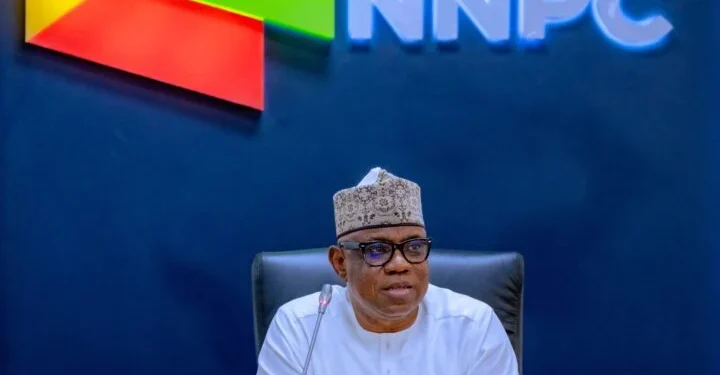The Nigerian National Petroleum Company Limited (NNPCL) Tuesday announced a whooping N6.008 trillion as revenue for the month of May 2025.
In a statement posted on its verified X handle, the amount is higher than the N5.972 trillion recorded in April.
According to its Monthly Report Summary for May 2025, the increase was possible due to improved crude oil and condensate production which stood at 1.629 barrels per day.
Profit-after-tax rose to N1.054 trillion in May from N926 billion in April representing a 14 per cent increase.
The company said that the sum of N5.583 represents statutory payment for the month January-April, 2025.
The report further stated that gas production rose slightly to 7.352 billion standard cubic feet per day just as gas sales dipped to 4.185bn mmscfd in May.
In terms of strategic projects, the company reported steady progress on the OB3 and Ajaokuta-Kaduna-Kano gas pipeline projects.
OB3, it said, achieved 96 per cent completion, while the AKK project reached 81 per cent. Upstream pipeline availability remained strong at 98 per cent.
The report also highlighted recent interventions such as the May turnaround maintenance of key pipelines including the Trans Escravos Pipeline, as well as multiple flow stations in OML 40 and OML 17.
“On strategic efforts, progressed technical interventions or AKK to resolve challenges of River Niger crossing and conducting detailed evaluation on OB3 RNC to determine the best project execution path going forward.
“Completed turnaround maintenance in May. Trans Escravos pipeline. Opuama flow station. Obigbo and Agbada flow stations.
“Refineries Status: PHRC WRPC and KRPC review in progress,” the report stated.
*CSR
Under its Corporate Social Responsibility portfolio, the NNPC Foundation said it completed 6,028 cataract surgeries across the country and distributed starter packs to 531 NYSC Corps members on May 22, while also providing MRI equipment to hospitals in Kano and Anambra states.
“Provision of MRI machines to the National Orthopedic Hospital, Dala-Kano (NOHDK) and Nnamdi Azikiwe University Teaching Hospital, Awka (NAUTH) is underway.
“A total of 4,931 vulnerable farmers in Nigeria’s southern region received comprehensive training on modern farming techniques, climate change adaptation, and market access,” NNPCL further said in the report.
*Re-evaluation of JV contracts
In related development, the federal government has expressed its preparedness to re-evaluate existing partnerships in the oil and gas sector.
This, it said, was to align with its strategic national objectives for resource development and economic value creation.
Minister of State for Petroleum Resources (Oil), Senator Heineken Lokpobiri announced this at the Nigerian Oil and Gas Conference 2025 in Abuja Tuesday.
He stated that the government was tired of promises, insisting that operators in the sector must begin to show performance.
The theme of the conference is ‘Accelerating Energy Progress Through Investment, Global Partnerships and Innovation.’
Addressing the gathering, Lokpobiri said: “It is no longer acceptable for critical national resources to remain in the hands of companies that lack the technical or financial capacity to optimize them or worse, those who use such licenses merely as a lever to access scarce capital, only to divert it to unrelated ventures. Our oil and gas industry has witnessed far too many cautionary tales of this nature, and we must now draw a clear line.
“Let’s be clear: Joint Ventures and Financial/Technical Services Agreements (FTSAs) are not weapons to hold the sector hostage. They are frameworks built on trust that you will act in the nation’s best interest. If you cannot, it’s time to step aside or step up through partnership.
“The mandate from His Excellency, President Bola Ahmed Tinubu, to the new NNPC Ltd Board to review all existing operatorship arrangements is not just an administrative exercise, it is a clear signal. Operators must wake up to the responsibility they hold. The era of dormant fields and underperforming assets must give way to action. Unlock dormant and untapped assets. Re-enter shut-in wells. Convert dormant licenses into measurable output.”
“It is worth noting, as a matter of strategic concern, that one company’s production volumes before the enactment of the Petroleum Industry Act (PIA) were higher than what we are all currently delivering today even with the full benefit of the incentives and business-friendly policies embedded not just in the PIA but, even with the presidential directives. So, this cannot be a Governance problem. I want to put it to you, the operators, what happened? How did we get here? And more importantly, what are we going to do differently?
“The Federal Government has implemented far-reaching reforms, executive orders, fiscal incentives, streamlined regulatory processes to make the work of operators easier and investment more attractive. But the question remains: where is the output?
We cannot continue this way. If we are serious about ramping up production and reclaiming Nigeria’s rightful place among leading oil producers, then every operator must show cause – by performance, not promises.
“We are not just chasing barrels. We are building an economy. One that reflects the aspirations of Nigerians, the commitment of this administration, and the immense potential of our resources.
“The government has done a lot, and is willing to do more, but the results must now speak for themselves. The responsibility is collective, but the obligation to deliver rests first with those holding the assets.
“We acknowledge that, in the past, the Local Content Act was sometimes misapplied. However, with the advent of President Bola Ahmed Tinubu, we are returning to the true tenets of Act one that allows companies, both large and small, to coexist and operate side-by-side. The era of briefcase contractors winning jobs only to sublet them to technically capable firms is coming to an end,” the minister further declared.
*PIA improves regulatory clarity
On his part, Minister of State, Petroleum Resources (Gas), Ekperikpe Ekpo, said the full implementation of the Petroleum Industry Act (PIA) has improved regulatory clarity and investor confidence, offering a single, transparent legal framework that investors can rely on.
Ekpo noted that while the Act introduced a revised fiscal framework that is more competitive globally, especially in the gas and deepwater sectors, he said “considerable progress has been made in addressing legacy debts to gas producers and ensuring commercial frameworks for key infrastructure are viable.
“The activation of the Midstream and Downstream Gas Infrastructure Fund (MDGIF) now provides a dedicated vehicle for capital mobilization. From modular gas plants to pipeline expansion and virtual gas networks, we are aligning investment incentives with project execution.”
With proven natural gas reserves which currently stand at 210.54 trillion cubic feet (tcf), the minister reiterated the government’s deep desire to utilize its huge gas resources.
He said: “Today, Nigeria boasts one of the largest proven gas reserves in the world with over 200 trillion cubic feet of proven natural gas reserves, yet we recognise that value is only created when resources are developed and utilised.
“Through the Decade of Gas Initiative, we are focused on translating our vast gas wealth into tangible socio-economic benefits. This includes driving industrialization, expanding power generation, increasing domestic LPG usage, deepening gas-to-transport adoption, and growing gas export capacity.
“The Ajaokuta–Kaduna–Kano (AKK) Gas Pipeline has achieved a significant milestone, marking a major leap in our drive to industrialize Northern Nigeria and strengthen internal gas distribution. We are equally optimistic that the OB3 Gas Pipeline and River Niger crossing will reach similar progress shortly, as we work to fully interconnect our national gas grid.”









